There are mathematical patterns throughout Bitcoin that repeatedly result in the numbers 3, 6 and 9, which show it may be the key to the universe.
This is an opinion editorial by Ella Hough, a student at Cornell University, pursuing degrees in cognitive science and moral psychology.
Recently, I’ve been looking into some of the numbers associated with Bitcoin. While I haven’t exactly come to an overarching conclusion, I find the very common presence of 0, 1, 2, and 6 together fascinating, along with 3 and 9.
The reason for my fascination came after reading the following quote and explanation of Nikola Tesla’s theory that “If you only knew the magnificence of 3, 6, and 9, then you would have a key to the universe.”
I believe Bitcoin is the “key” to solving many of the issues humanity faces, but I was curious if math thought so too.
Also, possibly irrelevant but still interesting is the lack of 2* or 8 being a solution to any of the equations outlined below.&

Note: In all instances throughout this article, I add the numerals until I reach 1 digit.
Let’s use the date this was written as an example: August 9, 2022.
08 + 09 + 2022 = 2039
2 + 0 + 3 + 9 = 14
1 + 4 = 5
Answer = 5
0, 1, 2 And 6
6102. 2,016. 21 and 6 zeroes. 21st century.
Question: 0, 1, 2, and 6. What do these numbers have in common?
Answer: Bitcoin.
“Executive Order 6102 is an executive order signed on April 5, 1933, by US President Franklin D. Roosevelt “forbidding the hoarding of gold coin, gold bullion, and gold certificates within the continental United States.” Executive Order 6102 required all persons to deliver on or before May 1, 1933, all but a small amount of gold coin, gold bullion, and gold certificates owned by them to the Federal Reserve in exchange for $20.67 (equivalent to $433 in 2021) per troy ounce” — Executive Order 6102
6 + 1 + 0 + 2 = 9
04 + 05 + 1933 = 1942 → 1 + 9 + 4 + 2 = 16 → 1 + 6 = 7
05 + 01 + 1933 = 1939 → 1 + 9 + 3 + 9 = 22 → 2 + 2 = 4
2 + 0 + 6 + 7 = 15 → 1 + 5 = 6
4 + 3 + 3 = 10 → 1 + 0 = 1
2 + 0 + 2 + 1 = 5
“Bitcoin’s mining difficulty is updated every 2,016 blocks. This is why each 2,016 block interval is called the difficulty epoch, as the network determines whether the activities of miners for the last two weeks have reduced or increased the time it takes to mine a new block” — Andrey Sergeenkov
2 + 0 + 1 + 6 = 9
This bitcoin mining difficulty update every 2,016 blocks is a palindrome of 6102.
There are 21,000,000 bitcoin.
2 + 1 + 6 zeroes = 9
If you would rather not count “6 zeroes”:
2 + 1 = 3
I believe it is no accident there are 21,000,000 bitcoin. I believe the connection between 0, 1, 2 and 6 is purposeful. I believe the fact that bitcoin’s mining difficulty is updated every 2,016 (a reverse of 6102) blocks shows a reversal in history, that your property is yours, no one can take it from you, and a reversal in precedent that the money supply is not something that can always be increased.
Decentralized and available to be used and held by every person on Earth, bitcoin is sound money. Furthermore, as Saifedean Ammous asserts in “The Bitcoin Standard,”
“Sound money… protects value across time, which gives people a bigger incentive to think of their future …When economic decision making is geared toward the future…People become more peaceful and cooperative…People develop a strong sense of morality, prioritizing the moral choices that will cause the best long-term outcomes for them and their children.”
This reality described is the final proof as to why I believe bitcoin of 21 and 6 zeroes are tools for the 21st century and will bring about positive change.
Facts
21st century → 2 + 1 = 3
October 31, 2008: The Bitcoin white paper was published, sparking an “Economic Reformation.”
10 + 31 + 2008 = 2049 → 2 + 0 + 4 + 9 = 15 → 1 + 5 = 6
October 31, 1517: Martin Luther publishes the “Disputation on the Power and Efficacy of Indulgences,” also known as “The 95 Theses,” a list of questions and propositions for debate, sparking the Protestant Reformation.
10 + 31 + 1517 = 1558 → 1 + 5 + 5 + 8 = 19 → 1 + 9 = 10 → 1 + 0 = 1
January 3, 2009: The genesis block is mined and the Bitcoin network was created.
01 + 03 + 2009 = 2013 → 2 + 0 + 1 + 3 = 6
January 3, 1521: “Pope Leo X issues the papal bull Decet Romanum Pontificem, which excommunicates Martin Luther from the Catholic Church.” (Source)
01 + 03 + 1521 = 1525 → 1 + 5 + 2 + 5 = 13 → 1 + 3 = 4
February 2140: Last bitcoin mined — 02 + 2140 = 2142 → 2 + 1 + 4 + 2 = 9
Time duration of bitcoin mining: 2140 - 2009 = 131 years → 1 + 3 + 1 = 5
Time duration of Protestant Reformation: 1648 - 1517 = 131 years → 1 + 3 + 1 = 5
The panic of 1893: The Gilded Age, a time of prosperity after the gold standard was restored, was interrupted once in 1893. Congress was convinced by newly inaugurated President Grover Cleveland to repeal silver purchased by the Treasury. The 21 below symbolizes that the 21 million bitcoin will prevent such chaos from ensuing again.
1893 → 1 + 8 + 9 + 3 = 21 → 2 + 1 = 3
Stock market crash of 1929: 36 years later, the lesson of increasing the money supply had still not been learned when “Benjamin Strong, chairman of the New York Federal Reserve … engaged in inflationary monetary policy … creat[ing] a larger bubble in the housing and stocks markets and priming the U.S. economy … for the inevitable collapse.” (Ammous). The collapse did come and began “the longest depression in modern recorded history” lasting 120 months (Ammous).
1929 → 1 + 9 + 2 + 9 = 21 → 2 + 1 = 3
120 → 1 + 2 = 3
December 10, 1948: The Universal Declaration of Human Rights was adopted by the UN General Assembly.
2008 - 1948 = 60 → 6 + 0 = 6
January 27, 1947 through February 10, 1947: Commission on Human Rights, First Session. The Commission on Human Rights was made up of 18 members from various political, cultural and religious backgrounds.
18 → 1 + 8 = 9
1947 → 1 + 9 + 4 + 7 = 21 → 2 + 1 = 3
Universal Declaration of Human Rights Article 21 states:
- Everyone has the right to take part in the government of his country, directly or through freely chosen representatives.
- Everyone has the right of equal access to public service in his country.
- The will of the people shall be the basis of the authority of government; this will shall be expressed in periodic and genuine elections which shall be by universal and equal suffrage and shall be held by secret vote or by equivalent free voting procedures.
July 26, 1947: Department of Defense Established
07 + 26 + 1947 = 1980 → 1 + 9 + 8 + 0 = 18 → 1 + 8 = 9
1947 → 1 + 9 + 4 + 7 = 21 → 2 + 1 = 3
In Satoshi Nakamoto’s Bitcoin white paper, the word “network” is mentioned exactly 21 times. Regardless of whether this was a purposeful action by Nakamoto, I choose to believe it speaks to the immense power Bitcoin holds to foster connection.
21 → 2 + 1 = 3
ASCII (And Unicode) Observations
- ASCII: “American Standard Code for Information Interchange, a standard data-encoding format for electronic communication between computers. ASCII assigns standard numeric values to letters, numerals, punctuation marks and other characters used in computers. Before ASCII was developed, different makes and models of computers could not communicate with one another.” (Source)
- Unicode: “However, even extended ASCII does not include enough code combinations to support all written languages. This limitation gave rise to new encoding standards — Unicode and UCS (Universal Coded Character Set) — that can support all the principal written languages. Because it incorporates ASCII as its first 128 code combinations, Unicode (specifically UTF-8) is backward-compatible with ASCII while also representing many characters that ASCII cannot. Unicode, which was introduced in 1991, saw its usage jump sharply in the first decade of the 21st century, and it became the most common character-encoding system on the World Wide Web.” (Source)
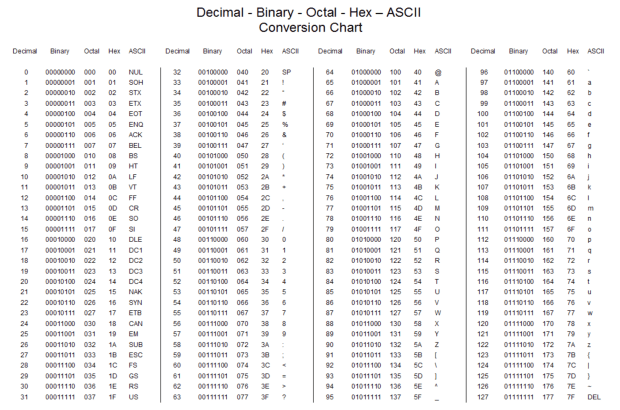
Computers can only process binary information (0s and 1s), and the smallest unit of information is called a bit (hence, bitcoin). The ASCII Code was created to encode characters using 8 bits (a string of eight 0s and 1s).
Given how foundational the number 8 is to computers, I find it incredibly interesting that 8 is not a solution to any of the equations in this article.
However, ASCII is limited to only 256 characters. Unicode was created to be universally inclusive and covers 128,000-plus characters.
To analyze text in computer code, you need to relate each character to binary. This relation is done by giving each letter a decimal value.
Let’s pause, for a moment, and explain how this decimal value is acquired.
- Each bit in the string of 8 bits can either be “in use” or “not in use.” 0 = off and 1 = on.
- Each bit represents a power of 2:
- 2^7, 2^6, 2^5, 2^4, 2^3, 2^2, 2^1, 2^0
- 2^7 = 128
- 2^6 = 64
- 2^5 = 32
- 2^4 = 16
- 2^3 = 8
- 2^2 = 4
- 2^1 = 2
- 2^0 = 1
Example: The letter “b” has a decimal value of 98.
What combination of 128, 64, 32, 16, 8, 4, 2, and 1 equals 98?
128 is too large, so let’s turn that “off.” Right now, our string of 8 bits looks like: 0XXXXXXX.
Now, let’s look for the largest powers of 2:
98 = 64 + … ?
= 64 + 32 + …?
= 64 + 32 + 2
Ok, so: 2^6, 2^5, and 2^1 can be turned “on.”
Now, our string of 8 bits looks like this: 01100010.
However, let’s say we were given the binary, not the decimal value. The value at 2^7 has a 0, so that means it is turned off; 128 is not in our equation; 2^6 has a 1, so that means it is turned “on”; 64 is in our equation. Follow this pattern, and your summation will equal 98.
Given Bitcoin’s relationship to the core of computers (through “bit”), I analyzed the letters of important words in Bitcoin (by using their decimal values from the chart above) in search of 3s, 6s and 9s.
“Satoshi Nakamoto.”
There are 15 letters in “Satoshi Nakamoto.” Adding the numerals 1 + 5 , you obtain the answer 6.
15 → 1 + 5 = 6
Now, using the ASCII decimal values from the chart above:
83 + 97 + 116 + 111 + 115 + 104 + 32 (space) + 105 + 78 + 97 + 107 + 97 + 109 + 111 + 156 + 111 = 1629
1629 → 1 + 6 + 2 + 9 = 18 → 1 + 8 = 9
“satoshi nakamoto”
115 + 97 + 116 + 111 + 115 + 104 + 32 (space) + 105 + 110 + 97 + 107 + 97 + 109 + 111 + 156 + 111 = 1693
1693 = 1 + 6 + 9 + 3 = 19 = 10 = 1
“Martin Luther”
There are 12 letters in “Martin Luther.” Adding the numerals 1 + 2 , you obtain the answer 3.
12 → 1+ 2 = 3
Now, using the ASCII decimal values from the chart above:
77 + 97 + 114 + 116 + 105 + 110 + 32 (space) + 76 + 117 + 116 + 104 + 101 + 114 = 1279
1279 → 1 + 2 + 7 + 9 = 19 → 1 + 9 = 10 → 1 + 0 = 1
“martin luther”
109 + 97 + 114 + 116 + 105 + 110 + 32 (space) + 108 + 117 + 116 + 104 + 101 + 114 = 1343
1343 → 1 + 3 + 4 + 3 = 11 → 1 + 1 = 2
*The one exception to “2” not being a solution.
Now, as I looked at the words “bitcoin,” “bitcon” (no repeated letters), “BITCOIN,” and “BITCON” (no repeated letters), I experimented, calculating the sums horizontally (as you’ve previously seen me do), vertically (simplifying all individual decimal values to one digit) and when repeated, letters/numbers were removed.
“bitcoin”
98 + 105 + 116 + 99 + 111 + 105 + 110 = 744 → 7 + 4 + 4 = 15 → 1 + 5 = 6
^
8 + 6 + 8 + 9 + 3 + 6 + 2 = 42 → 4 + 2 = 6
^
8 + 6 + 9 + 3 + 2 = 28 → 2 + 8 = 10 → 1 + 0 = 1 (w/ no repeated #s)
“bitcon” (w/ no repeated letters):
98 + 105 + 116 + 99 + 111 + 110 = 639 → 6 + 3 + 9 = 18 → 1 + 8 = 9
^
8 + 6 + 8 + 9 + 3 + 2 = 36 → 3 + 6 = 9
^
8 + 6 + 9 + 3 + 2 = 28 → 2 + 8 = 10 → 1 + 0 = 1 (w/ no repeated #s)
“BITCOIN”
66 + 73 + 84 + 67 + 79 + 73 + 78 = 520 → 5 + 2 + 0 = 7
^
3 + 1 + 3 + 4 + 7 + 1 + 6 = 25 → 2 + 5 = 7
^
3 + 1 + 4 + 7 + 6 = 21 → 2 + 1 = 3 (w/ no repeated #s)
BITCON (w/ no repeated letters):
66 + 73 + 84 + 67 + 79 + 78 = 447 = 15 → 1 + 5 = 6
^
3 + 1 + 3 + 4 + 7 + 6 = 24 → 2 + 4 = 6
^
3 + 1 + 4 + 7 + 6 = 21 → 2 + 1 = 3 (w/ no repeated #s)
BTC
66 + 84 + 67 = 217 → 2 + 1 + 7 = 10 → 1 + 0 = 1
Yes, BTC is #1.
Conclusion
A few months ago, I saw the reappearance of 0, 1, 2 and 6 in core elements of Bitcoin as too purposeful to be a coincidence. Curious about other symbolic elements of Bitcoin, hidden in numbers, I started a running note of important dates and people related to Bitcoin.
This article showcases the first 45 summations of that note, analyzed to see if bitcoin has a connection to 3, 6 and 9, supposedly the keys to the universe. Let’s look at a tally:
3: 11 times
6: 9 times
9: 9 times
1: 7 times
5: 3 times
7: 3 times
4: 2 times
2: 1 time
8: 0 times
3, 6, and 9: 29 times = 64%.
My answer is yes. Bitcoin does have a connection to 3, 6 and 9. From these numbers, which are selective, math thinks Bitcoin is 64% of the key to the universe. However, I still believe bitcoin is the key to solving many of the issues our world faces; it is our number one tool, and maybe math really does think so, too: 64 → 6 + 4 = 10 → 1 + 0 = 1.
This is a guest post by Ella Hough. Opinions expressed are entirely their own and do not necessarily reflect those of BTC Inc. or Bitcoin Magazine.

You can get bonuses upto $100 FREE BONUS when you:
💰 Install these recommended apps:
💲 SocialGood - 100% Crypto Back on Everyday Shopping
💲 xPortal - The DeFi For The Next Billion
💲 CryptoTab Browser - Lightweight, fast, and ready to mine!
💰 Register on these recommended exchanges:
🟡 Binance🟡 Bitfinex🟡 Bitmart🟡 Bittrex🟡 Bitget
🟡 CoinEx🟡 Crypto.com🟡 Gate.io🟡 Huobi🟡 Kucoin.


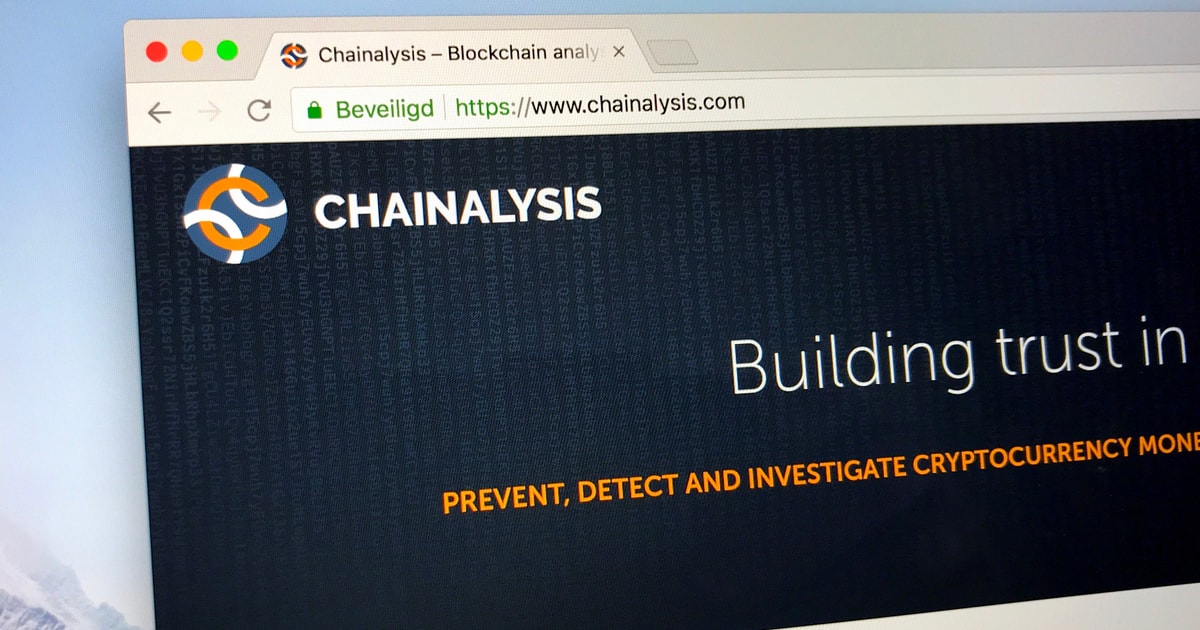





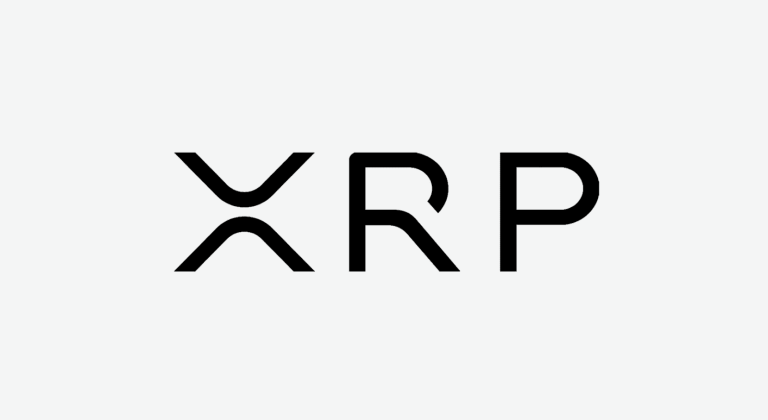
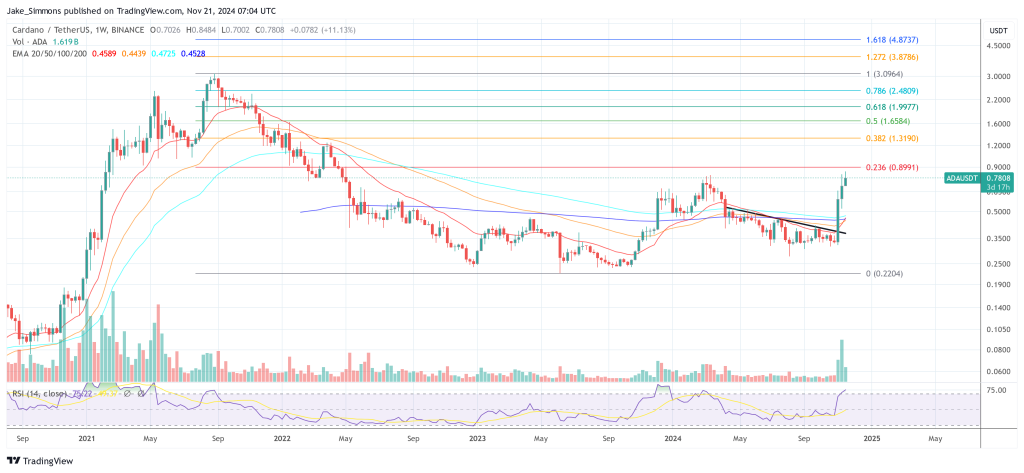

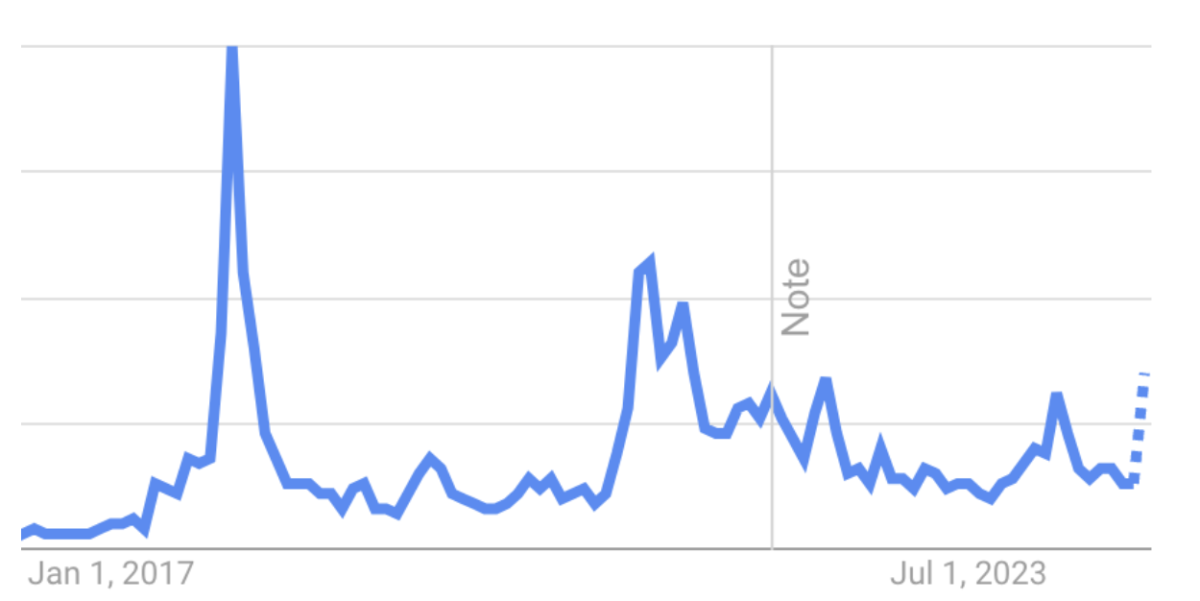




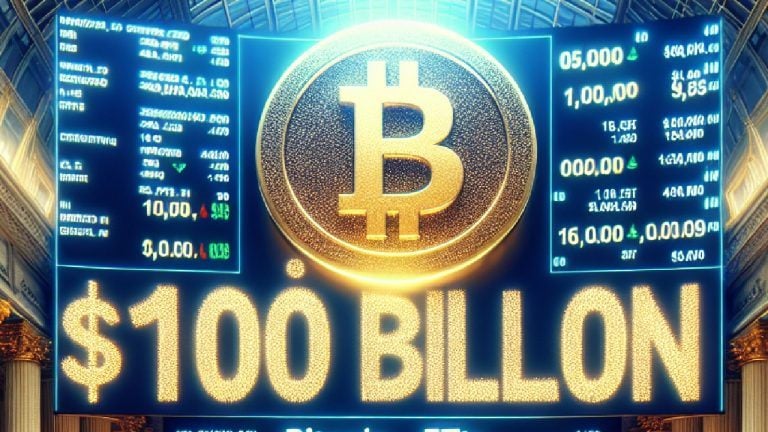
Comments